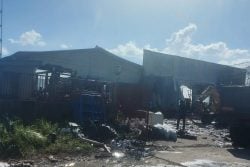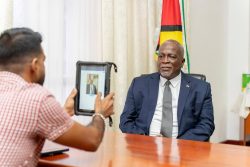NAIROBI, (Reuters) – Deep in Kenya’s Great Rift Valley, members of the National Youth Service tirelessly swing machetes to clear dense shrubs obscuring railway tracks more than a century old.
It’s a distinctly low-tech phase for China’s Belt and Road drive in Africa to create the trade highways of the future.
There’s not enough money left to complete the new 1,000-km super-fast rail link from the port of Mombasa to Uganda. It ends abruptly in the countryside, 468 km short of the border, and now Kenya is resorting to finishing the route by revamping the 19th-century colonial British-built tracks that once passed that way.
China has lent African countries hundreds of billions of dollars as part of President Xi Jinping’s Belt and Road Initiative (BRI) which envisaged Chinese institutions financing the bulk of the infrastructure in mainly developing nations. Yet the credit has dried up in recent years.
On top of the damage wrought to both China and its creditors by COVID-19, analysts and academics attribute the slowdown to factors such as a waning appetite in Beijing for large foreign investments, a commodity price crash that has complicated African debt servicing, plus some borrowers’ reluctance to enter lending deals backed by their natural resources.
“We are not in the go-go period anymore,” Adam Tooze, a Columbia University historian, said about China’s overseas investment projects. “There is definitely a rebalancing from the China side,” said Tooze, whose new book Shutdown examines how COVID-19 affected the world economy, adding that Beijing’s current account surplus was “dwindling somewhat”.
Chinese investments in the 138 countries targeted by BRI slid 54% from 2019 to $47 billion last year, the lowest amount since the BRI was unveiled in 2013, according to Green BRI, a China-based think-tank that focuses on analysing the initiative.
In Africa, home to 40 of those BRI nations, Chinese bank financing for infrastructure projects fell from $11 billion in 2017 to $3.3 billion in 2020, according to a report by international law firm Baker McKenzie.
This is a blow for governments who were anticipating securing Chinese loans to build highways and rail lines linking landlocked countries to sea ports and trade routes to Asia and Europe. The continent is facing an estimated annual infrastructure investment deficit of around $100 billion, according to the African Development Bank.
“The pandemic has actually made things worse. Those numbers will go up,” said Akinwumi Adesina, the president of the bank, citing the need for additional infrastructure to support health services.
Hold-ups have hit some other BRI projects across the continent, such as a $3 billion Nigerian rail project and a $450 million highway in Cameroon.
China’s ministry of foreign affairs did not respond to a request for comment.
Beijing officials have said that the two sides have a mutually beneficial and cooperative relationship and that lending is done openly and transparently.
“When providing interest-free loans and concessional loans, we fully consider the debt situation and repayment capacity of the recipient countries in Africa, and work in accordance with the law,” Zhou Liujun, vice chairman of China International Development Cooperation Agency told reporters in late October.
Another Chinese official, who declined to be named as they are not authorised to speak to the media, said Beijing always intended to implement BRI gradually to manage debt default risks by countries or projects.





